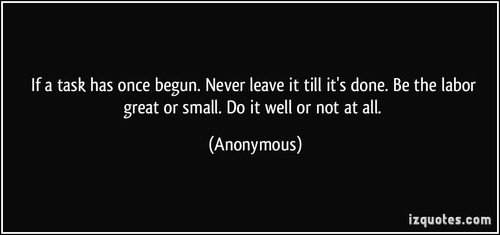
By Jonathan Dunnemann
"IF a task you once begun never leave until it’s done be the labor
great or small, do it well or not at all." This is an Anonymous quote
that my father-in-law retired Sergeant Major William E. Smithers taught
his three daughters while they were still young girls. All three of the
husbands know this saying as well, and it continues to serve as an
important test of our moral character and the inner fortitude
undergirding whatever task lay before us especially in faithfully
fulfilling the important responsibility of providing for each of our
families needs. That brief quote like so many other ‘golden nuggets’
about wisdom holds the power to transform a person’s past approach to
living in the world if one will only commit it to memory and heart.
Today, it seems like a very long time ago when I first began a
personal search for exemplary principles, time tested teachings, and
universal values aimed at increasing the self-awareness, self-control,
motivation to act intentionally, and overall decision making of
adolescents. Never an expert in these areas myself, I resolved to
identify and consult with highly admired and widely trusted individuals
and to diligently examine an assortment of information on the subjects
of resilience, self-efficacy, and spiritual transformation.
One of the most inspiring pieces of written material that I have ever
come across is that of “Invictus”, a short Victorian poem by the
English poet William Ernest Henley (1849–1903).
The poem was written in 1875 and first published in 1888[3] in Henley’s Book of Verses, where it was the fourth in a series of poems entitled Life and Death (Echoes).[4] It originally bore no title.[4] Early printings contained only the dedication To R. T. H. B.—a reference to Robert Thomas Hamilton Bruce (1846–1899), a successful Scottish flour merchant and baker who was also a literary patron.[5] The familiar title “Invictus” (Latin for “unconquered”[6]) was added by Arthur Quiller-Couch when he included the poem in The Oxford Book Of English Verse (1900).[7][8]
Out of the night that covers me,
Black as the pit from pole to pole,
I thank whatever gods may be
For my unconquerable soul.
In the fell clutch of circumstance
I have not winced nor cried aloud.
Under the bludgeonings of chance
My head is bloody, but unbowed.
Beyond this place of wrath and tears
Looms but the Horror of the shade,
And yet the menace of the years
Finds and shall find me unafraid.
It matters not how strait the gate,
How charged with punishments the scroll,
I am the master of my fate:
I am the captain of my soul.
In the 1945 film Kings Row, Parris Mitchell, a psychiatrist played by
Robert Cummings, recites part of “Invictus” to his friend Drake McHugh,
played by former President Ronald Reagan, before revealing to Drake
that his legs were unnecessarily amputated by a cruel doctor.
While incarcerated on Robben Island prison, Nelson Mandela recited
the poem to other prisoners and was empowered by its message of
‘self-mastery’.
In the 2009 movie Invictus, produced and directed by Clint Eastwood,
the poem is referred to several times. It becomes the central
inspirational gift from Mandela, played by Morgan Freeman, to Springbok
rugby team captain François Pienaar, played by Matt Damon, in advance of
the post-apartheid Rugby World Cup hosted in 1995 by South Africa and
won by the underdog Springboks.
In Napoleon Hill’s book, Think And Grow Rich, this poem is quoted and
discussed. Hill added that, we are master and captain, “… because we
have the power to control our thoughts”. We are warned that this
“power”, alluded to in Henley’s poem, “… makes no attempt to
discriminate between destructive thoughts and constructive thoughts”.
Napoleon Hill explains that the conscious choice is laid upon the
individual and suggests that the poet left others to, “… interpret the
philosophical meaning of his lines”.[1]
The development of the inner powers of the will and its prudent use
is of utmost importance. St. Augustine, with one of his concise and apt
expressions, said, “Homines sunt voluntates” (men are will). Indeed,
it is the will that constitutes the real innermost center of man; it is
that which makes him truly himself. Without it, the ablest and most
intelligent individual would be no more than an ingenious automation
(Assagioli, Date N/A).[2]
William James said…
For morality life is a war, and the service of the highest is a sort of cosmic patriotism which also calls for volunteers. Even a sick man, unable to be militant outwardly, can carry on … [in] moral warefare. He can willfully turn his attention away from his indifference to his present drawbacks and immerse himself in whatever objective interests still remain accessible. He can follow public news, and sympathize with other people’s affairs. He can cultivate cheerful manners, and be silent about his miseries. He can contemplate whatever ideal aspects of existence his philosophy is able to present to him, and practice whatever duties, such as patience, resignation, trust, his ethical system requires. Such a man lives on his loftiest, largest plane. He is a high-hearted freeman and no pining slave.[3]
What new task are you about to begin in your life? Are you ready to
chart the course? Would you like a helper at this time in your life to come alongside you on your
journey? Geez, I thought you would never ask. Thank you, why yes of course I
will be very happy to join you.
[1] From Wikipedia, the free encyclopedia. (http://en.wikipedia.org/wiki/Invictus)
[2] Assagiolo, M.D., R. (N/A). The Training of the Will (http://www.synthesiscenter.org/articles/0117.pdf)
[3]James, W., (2004). The Varieties of Religious Experience – A Study in Human Nature. With Introduction and Notes by Wayne Proudfoot Barnes & Noble Classics. New York.
No comments:
Post a Comment